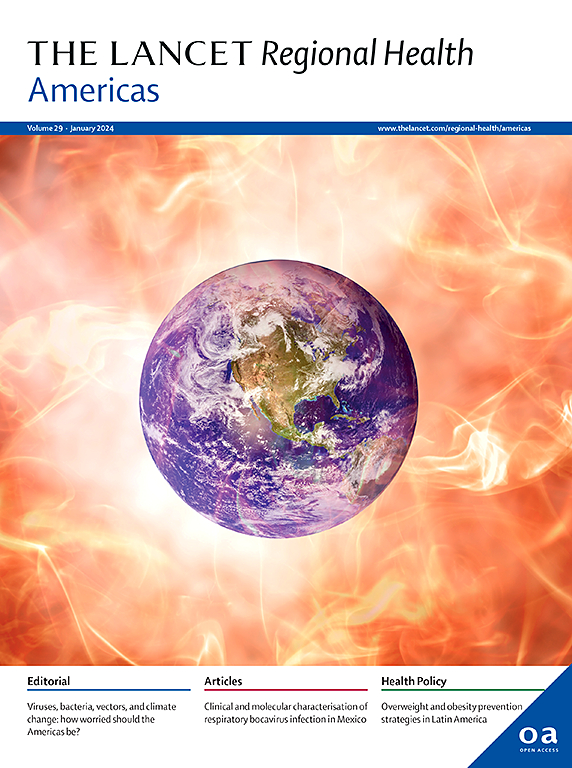Associations of Helicobacter pylori with metabolic dysfunction-associated steatotic liver disease and related conditions: cross-sectional results from the Hispanic Community Health Study/Study of Latinos
IF 7
Q1 HEALTH CARE SCIENCES & SERVICES
引用次数: 0
Abstract
Background
Hispanic/Latino populations have been reported to have high rates of both metabolic dysfunction-associated steatotic liver disease (MASLD) and Helicobacter pylori infection. Several observational studies, predominantly from Asian populations, have suggested a link between these conditions. Thus, the primary objective of the current study was to examine the association between H. pylori and MASLD and secondarily, to assess its association with related conditions in the Hispanic Community Health Study/Study of Latinos.
Methods
In this cross-sectional study, a total of 16,144 participants with baseline data on H. pylori serology were included. Based on weighted statistics, the median age was 40 years [interquartile range (IQR): 28, 52]; 52.2% women (n = 9661) and 47.8% men (n = 6483). Participants’ Hispanic/Latino heritage included 37.6% Mexicans (n = 6397), 20.1% Cubans (n = 2307), 15.8% Puerto Ricans (n = 2663), 10.0% Dominicans (n = 1447), 7.4% Central Americans (n = 1710), 4.9% South Americans (1052). MASLD was estimated using the Fatty Liver Index (FLI) and the Hepatic Steatosis Index (HSI). Other conditions examined were obesity, central obesity, diabetes and metabolic syndrome. Multivariable logistic regression models were used to calculate the ratios of (adjusted) prevalences (RP) and 95% confidence intervals (CI) for the overall association of H. pylori seropositivity with MASLD and related conditions. Analyses were also stratified by Hispanic/Latino heritage.
Findings
The overall prevalence of MASLD ranged from 47% (FLI) to 65% (HSI). After accounting for age, sex, education, and other key variables, the analysis found a modest association between H. pylori seropositivity and MASLD as determined by HSI (RP: 1.06, 95% CI: 1.02–1.10) overall, and among individuals of Puerto Rican and Mexican heritages. Furthermore, an overall association between H. pylori seropositivity and obesity was observed (RP: 1.09, 95% CI: 1.02–1.16).
Interpretation
This study provides support for a positive association of H. pylori seropositivity with MASLD and obesity among Hispanic/Latino populations. However, given the exploratory nature of these findings, caution is warranted in their interpretation. Further research is necessary to establish causality and examine potential mechanisms of these associations.
Funding
The Hispanic Community Health Study/Study of Latinos was carried out as a collaborative study supported by contracts from the National Heart, Lung, and Blood Institute (NHLBI) to the University of North Carolina (N01-HC65233), University of Miami (N01-HC65234), Albert Einstein College of Medicine (N01-HC65235), Northwestern University (N01-HC65236), San Diego State University (N01-HC65237), and University of Illinois at Chicago (HHSN268201300003I). The following Institutes/Centers/Offices contribute to the HCHS/SOL through a transfer of funds to the NHLBI: National Institute on Minority Health and Health Disparities, United States, the National Institute of Deafness and Other Communications Disorders, the National Institute of Dental and Craniofacial Research, the National Institute of Diabetes and Digestive and Kidney Diseases, the National Institute of Neurological Disorders and Stroke, and the Office of Dietary Supplements. This study was also funded in part by the Intramural Research Program of the National Cancer Institute.
求助全文
约1分钟内获得全文
求助全文
来源期刊

Lancet Regional Health-Americas
Multiple-
CiteScore
8.00
自引率
0.00%
发文量
0
期刊介绍:
The Lancet Regional Health – Americas, an open-access journal, contributes to The Lancet's global initiative by focusing on health-care quality and access in the Americas. It aims to advance clinical practice and health policy in the region, promoting better health outcomes. The journal publishes high-quality original research advocating change or shedding light on clinical practice and health policy. It welcomes submissions on various regional health topics, including infectious diseases, non-communicable diseases, child and adolescent health, maternal and reproductive health, emergency care, health policy, and health equity.
 求助内容:
求助内容: 应助结果提醒方式:
应助结果提醒方式:


